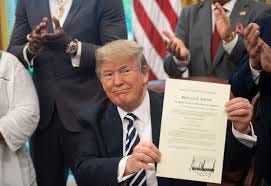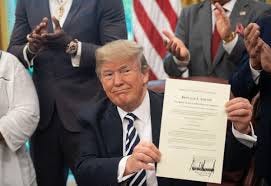Pardon Games
Pardons have been front and center in 2025 between the Biden Administration's waning days and the early days of the Trump Administration. They are quickly becoming a political tool.
Justice Briefs is a weekly newsletter devoted to federal criminal prosecution. The federal government’s evolution over the last 230 years has given federal prosecutors significant discretion. Few realize it exists and even fewer know how it is used. Justice Briefs aims to make federal prosecutions and prosecutors more accessible to the general public. Please help me in this endeavor by subscribing and sharing with others.
Justice in Brief
In the Northern District of Illinois, a man entered a guilty plea to attempting and conspiring to destroy a national defense installation for a plot to attack the Naval Station Great Lakes on behalf of the Iranian Revolutionary Guard Force.
In the Eastern District of North Carolina, a man entered a guilty plea to attempting to export acceleromators to China. Acceleromators play an important role in flight testing military aircraft.
In the District of Colorado, a dentist entered a guilty plea to illegally creating tax shelters to hid $3.5 million of income over a five-year period.
Updates…
While awaiting former Solicitor General Paul Clements brief on the dismissal of New York City Mayor Eric Adams’s case (due March 7), the acting US Attorney for the District of Columbia continued reshuffling the office as he demoted several high-level attorneys to the misdemeanor section. All the demoted attorneys handled cases related to January 6 or Donald Trump associates Peter Navarro and Steve Bannon.
Excuse me, pardon me…
On the first day of Donald Trump’s second bite at the Presidency, he pardoned and commuted the sentences of anyone prosecuted for events occurring on January 6, 2021. He proclaimed, “This proclamation ends a grave national injustice that has been perpetrated upon the American people over the last four years and begins a process of national reconciliation.” The afternoon pardons and commutations followed a morning where outgoing President Joe Biden issued a collection of pardons and commutations himself. The previous month, President Biden pardoned his son, brother and other family members. These pardons demonstrate that presidents of both parties now use the pardon more as a political tool than a means to correct injustices resulting from the administration of criminal law.
Article II, Section 2 of the Constitution grants the Executive the power “to grant Reprieves and Pardons for Offences against the United States, except in Cases of Impeachment.” Granting the Executive this power resulted from two debates during the Constitutional Convention. The first was a brief debate over whether pardons should only be permitted after conviction. Maryland’s Luther Martin, who would become an ardent opponent to the Constitution, offered the proposition. Pennsylvania’s James Wilson, who would become one of the first Supreme Court Justices, responded that pardon before conviction was necessary to secure accomplice testimony, especially in forgery cases. Martin conceded this and withdrew his proposition.
The second debate came near the end of the Convention as the members debated the pardon power in treason cases. Virginia’s Edmund Randolph, who would become the federal government’s first Attorney General, argued that a limit on treason prosecutions should be included. Future President James Madison initially had the limitation but it had been removed during the drafting stage. Randolph saw treason as too serious an offense to leave to the President to pardon. After all, Randolph reasoned, the Executive could be a party to the treason. Randolph believed the legislature should oversee treason pardons. This faced considerable opposition. Wilson argued that if the Executive was involved in the treason then the Executive would be liable to impeachment and prosecution. Madison sought a compromise, returning to his original idea that the Senate must concur in treason pardons. Randolph and Virginia’s George Mason both opposed. Thus, when Randolph’s motion was voted upon, the members voted against it.
These debates show that those who drafted the Constitution recognized the ability to pardon people was a powerful tool and that it could be misused. This was especially true in circumstances where the Executive was connected to the criminal behavior.
The nation’s first Executive, George Washington’s use of the pardon power provides some insight. In some ways, Washington used the pardon power to correct injustices within the criminal courts. One of his first pardons was Samuel Dodge, a customs collector for the Port of New York. He had been charging with unloading cargo after 7:00pm. Removing the cargo after 7:00pm had only become a crime a few days prior. After some discussion, Washington agreed to pardon Dodge if Dodge entered a guilty plea. Washington also used the pardon power as a practical measure. This occurred during the Whiskey Insurrection when residents of western Pennsylvania violently protested the federal government’s whiskey tax. A federal judicial system that probably had not had more than 100 criminal cases in total faced several hundred cases in just one court. Washington issued the first blanket pardon to those who were willing to pay the tax. Later, Washington pardoned those leading the resistance. He also pardoned—for symbolic reasons— the only two people convicted of treason in the incident. Then, on his last day in office, Washington began a tradition that continues through 2025. He pardoned all the remaining Whiskey Insurrection offenders save one.
These debates and early practices draw a clear line between the nation’s founding and today’s pardon use. The debates foresaw the Executive’s involvement in dubious behavior and expressed concern about how the Executive might allow misconduct to go unpunished. The early practices show that pardons were used to correct injustice while upholding the government’s interests. Neither Presidents Biden nor Trump have lived up to these standards.
President Biden’s pardons fall into two groups. The first group is his family. Undoubtedly Biden believed that President Trump would target Biden’s family, especially after the US Supreme Court essentially gave Biden complete immunity in its presidential immunity decision. This does not provide justification, however, for using the pardon power for personal benefit. While there are no legal or constitutional limits on doing so, it sets a bad precedent. If we expect the other side to act in a respectable manner, we must first act respectfully ourselves. If we take advantage of things we can do but should not do, we cannot complain when the other side does them too.
The second category of Biden’s pardons are what is known as pre-emptive pardons. They were done for the same reason as the family pardons. President Biden suspected that the Trump Administration would investigate President Trump’s political enemies. They included high-ranking government officials and former members of Congress. There was no public evidence that they had committed any crime other than opposing Donald Trump. To spare these officials the investigation and potential prosecution, President Biden pardoned them. This pardon sends a message of fear and creates a presumption that the possibly did something wrong. The more courageous path would have been to let the Trump Administration carry out its investigation. If those whom Biden pardoned did, in fact, commit a crime, then they should be prosecuted. If they did not, then the failed investigation would show all that President Trump’s claims were unfounded. Instead, the image is that Biden used the pardon power to shield his political friends.
This is no different than what President Trump did later in the day when he pardoned and commuted the sentences of those involved in the January 6 events. Those involved on January 6, 2021 committed their crimes on behalf of then-President Donald Trump. They sought, at minimum, to delay the official electoral vote count by engaging in violence. The incident results in 1000s of cases entering the DC District Court, overwhelming the US Attorney’s Office to the point where it required a special task force and borrowed federal prosecutors from around the country. Despite this challenge, the court handled the influx and prosecutors secured convictions in nearly every case, including against the main leaders.
On a surface level, the pardons look similar to the Whiskey Insurrection pardons. A slightly deeper look reveals two important differences. Washington’s pardons were for people who opposed his policies and administration. His pardons were not done to benefit himself or his allies. It was, truly, an effort to put the event behind the nation. President Trump’s pardon went to his political friends. It was not, as he attempted to define it, an act of “national reconciliation.” It was, instead, an act to reward his adherents. Washington’s blanket pardon was conditioned on the payment of the tax by those who protested. The pardon achieved the government’s objective. The same can not be said about President’s Trump’s pardons. As President Trump’s proclamation stated, the blanket pardon “ends a grave national injustice that has been perpetrated upon the American people…” This was designed to release his political followers rather than secure a national objective.
Against this backdrop a new twist in the pardon power emerged last week. An assistant US Attorney announced that one of the pardoned January 6 defendants was also pardoned for crimes unrelated to the January 6 incident but that were discovered as part of the criminal investigation. In the case, the defendant faced sentencing for unlawful firearm storage. Though the US Attorney’s Office for DC had initially said the pardon did not cover this, it changed its view last week, announcing that the President’s intent was to cover such offenses as well. The US Attorney’s Office selectively applied this to other cases last week, applying it to weapons offenses but not child pornography. The new interpretation relies on the language in President Trump’s pardon that pardoned people for anything “related to” events at the Capital on January 6. This interpretation rests on a broad reading of “related to.” It also raises an important question of whether a court must accept the government’s position or can exercise its own discretion to interpret the pardon. The judge has yet to answer that question.
All of this reiterates a simple but very important point. The executive branch and, by extension, federal prosecutors possess vast discretion to employ law enforcement machinery. Procedural protections only work so well. More important is the character of those who exercise the power. In the case of the recent use of pardons, that character has been lacking.
I hope you enjoyed this issue and that it made you stop and think. I would love to hear any comments, questions, concerns, or criticisms that you have. Leave a comment or send a message! Also, if you enjoyed this or if it challenged your thinking, please subscribe and share with others!




